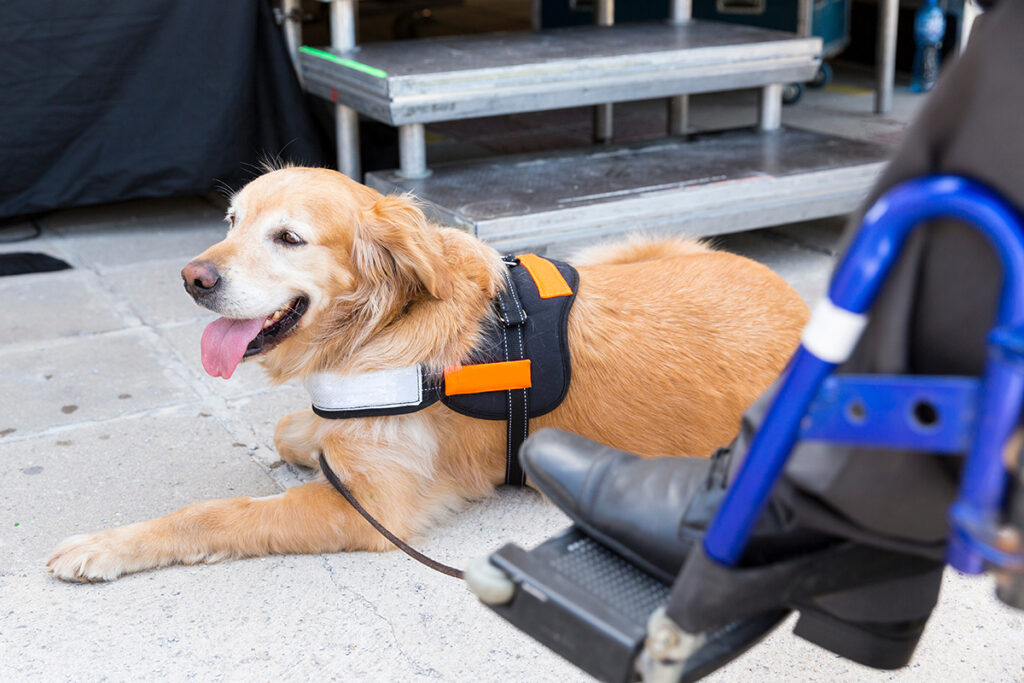What would you do if on a normal day in your office, you discovered a dog sitting in your waiting room?
You’d probably be surprised, to say the least. After all, you’re trained to treat humans, not animals.
While this may seem like a wild scenario, it’s not as uncommon as you might think.
No, the animal isn’t there for a casual checkup. More likely, it’s accompanying a human patient who is.
For many people suffering from disabilities, they’re a necessity.
And, it’s one you’ll need to handle appropriately.
The Roles of Service Animals
Service animals are far more than a common pet, and don’t fall under the same category. In fact, they’re not even legally considered pets.
According to the Americans with Disabilities Act (ADA), “Service animals are defined as dogs that are individually trained to do work or perform tasks for people with disabilities.”
Not horses, not parakeets, not cats; only dogs are classified as such.
These animals are trained to do critical work or perform tasks to aid those in need.
For example, you’re probably familiar with “guide dogs”, which work with blind people. As their name implies, these highly-trained dogs safely guide their owner through unfamiliar spaces.
Other service animals sense chemical changes within the brains of people suffering from seizure disorders. When detected, their owners are alerted and proper precautions can be taken.
However, it’s important to note that while these service animals are covered by federal law under the ADA, therapy animals (also referred to as emotional support animals) are not.
Emotional support animals, comfort animals, and therapy dogs are not considered service animals under Title II and Title III of the ADA
These animals, whether dog, cat, or bird, comfort those dealing with stress, anxiety, or traumas.
While a trip to your dental office is stressful for many, it’s important to note the difference. Emotional support animals, though comforting to patients, aren’t always as highly trained as service dogs.
And, they’re not always protected by the same laws.
Are Service Animals Clean?
Your dental office maintains a high level of cleanliness. After all, your patients’ health depends on it.
So, when a service animal walks into your office, should you be concerned?
It’s an issue the Center for Disease Control and Prevention (CDC) has looked into for health professionals like yourself.
According to the CDC, there is no evidence suggesting these animals pose a more significant risk of transmitting infection than people.
Standard cleaning procedures are generally sufficient following the presence of a service animal.
The guidelines from the CDC states, “If the healthcare personnel, visitors and patients are able to enter areas without additional precautions to prevent transmission of infectious agents, then the service animal should also be allowed access.”
However, these findings don’t mean there are no situations where the service animal may have to be removed.
For instance, if the patient’s situation or the particular animal creates a risk that can’t be eliminated through reasonable measures, an exception exists. In such cases, you’ll need to hold a respectful conversation with the handler.
Are there Exceptions to Service Animals in Dental Offices?
Circumstances regarding service animal in your dental office doesn’t mean turning it into a common pet park.
Your office is a professional, healthy environment, and it’s important to keep it that way.
If someone brings an animal into your office during a visit, it’s only natural to wonder if it’s for a legitimate purpose.
In this case, there are two questions you can ask to ensure the animal is there for a genuine purpose – not for recreational company.
- Is the dog a service animal required because of a disability?
- What work or task has the dog been trained to perform?
You’re not allowed to request any documentation for the dog, require the dog to demonstrate a task, or inquire about the nature of the person’s disability.
These answers help provide evidence to help you understand if the presence of the animal matches criteria set by the ADA.
If the answers to these questions can be provided in a way that justifies the presence of the animal, then the patient is permitted to have the animal.
Though some owners can provide you with certification for the animal, it’s not something you can legally ask for.
Can You Deny a Service Animal in Your Dental Office?
For the most part, no – you cannot deny entry of service animals in your dental office. However, in certain circumstances, exceptions exist.
The ADA lists the reasons permitting you to deny entrance to service animals as following:
- The person says that they are not disabled.
- The person says the animal is not a service animal.
- The animal shows aggression towards the owner or another human.
- The presence of the service animal will result in a fundamental alteration to the nature of the business.
- The animal is barking constantly (except as a service-related task such as barking to alert the owner to a situation or sound.)
- If a service animal is physically ill.
- If the service animal is unreasonably dirty.
No matter what happens, treat your patients with dignity and respect.
The Takeaways
While it’s not every day you’ll encounter a patient with a service animal, it’s important to be prepared and fair when you do.
Though federal laws require acceptance of these incredible animals, be sure to check your own state and local laws regarding service animals in your dental office.
Depending on where you’re practicing, there may be further regulations regarding which animals are acceptable.
Every patient deserves respect and care. For those in need, acceptance of their furry companions is a major part.





